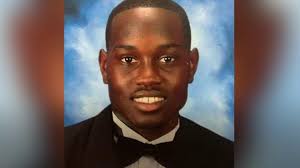Three days ago, I noticed that a name was circulating on my Twitter time line. The name was Ahmaud Arbery. Admittedly, I didn’t pay the name any mind at first, as the tweets were quite infrequent, so the severity of the situation didn’t register. Then I went to Instagram and again I saw this same name popping up in stories and feeds and this time, curiosity compelled me to click on one of the posts. I was taken to a video of an unarmed black man jogging and then two white men jumping out of a car, running towards this unarmed black man and shooting him two, maybe three times. “Oh my God” was what came out of my mouth next and then I watched the video again and again and by the time I was done I felt disappointed but not surprised.
Footage of dead black bodies sprawled across the internet is something we have become used to. Psychologists call it desensitisation, that is the process by which our emotional responsiveness to something is altered as a result of repeated exposure to that something. This is why, when presented with a new hashtag our (some not all) default is, “oh another one” and then we scroll on by and it’s a shame. It’s a shame that we’ve even gotten here. It’s a shame that we have to argue over whether it’s appropriate to spread awareness vis a vas a video or whether that video is a pawn by which we get our entertainment “high”. It’s a shame that your 12 year old black kid from Ohio could be mistaken for a grown man, or that your father could be strangled to death after repeatedly screaming “I can’t breathe” or that you could be vilified your entire career as a black female politician for simply existing. So it does beget the question, when did it become a crime to be black?
Why do the hues of our skin offend so much? Why does our concentration of melanin incite so much hatred? Why do our full lips antagonise? Moreover, why does our hair cause others to descend into confusion? I’m not one to play into oppression politics, as I find that often it damages our collective psyche to the point where healing and freedom are afterthoughts and victimhood takes centre stage but how can I even blame us for engaging in these conversations? We’re constantly being confronted with the messaging that we have to mind ourselves or face the repercussions. Mind how you dress, mind how you speak in public, mind how you’re chilling in your own home (Botham Jean), mind how you’re perceived through your own window (Atatiana Jefferson) and now mind how you jog? Mind how you jog? It’s not enough that you are an abiding citizen, it’s not enough that you’re not doing something illegal, it’s not enough that you try to assimilate into the various cultures and sub-cultures, it’s not enough that you ensure you defy stereotypes – just mind how you exist.
We’re not only incensed, we’re also exhausted and with good reason.
The optimist in me wants to say that things will change and vile conceptions around race, particularly where it pertains to black people will keep chipping away and one day become completely displaced but that isn’t reality. That’s not the reality our thumbs and eyes engage with through our little screens or the reality staring back at us through our big screens. We’ll likely keep facing racism, whether systematic or not, we’ll likely keep being judged by stereotypes whether overtly or covertly and our pain will likely keep being overlooked as we’re told to get over it.
So I ask again, when did it become a crime to be black?
